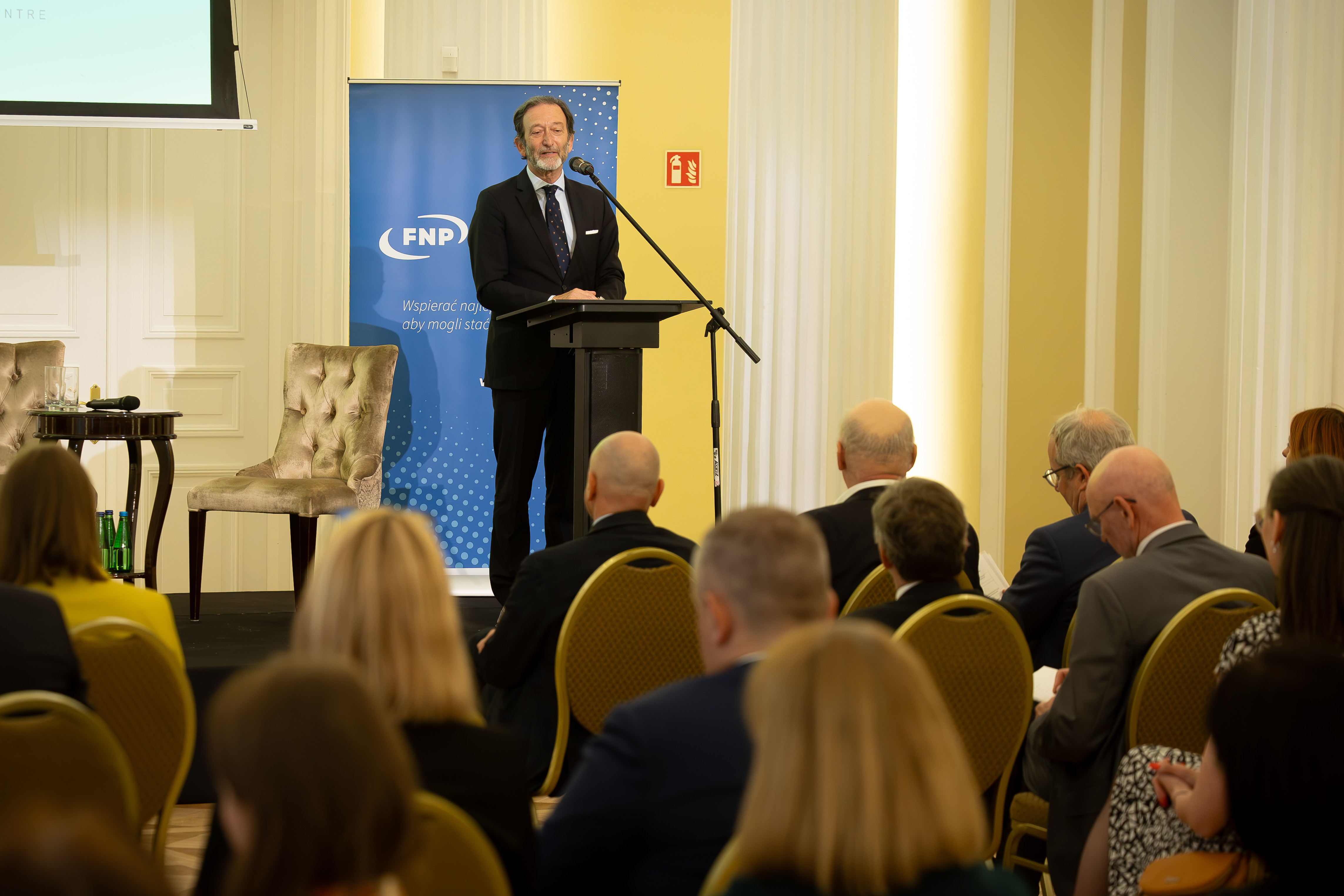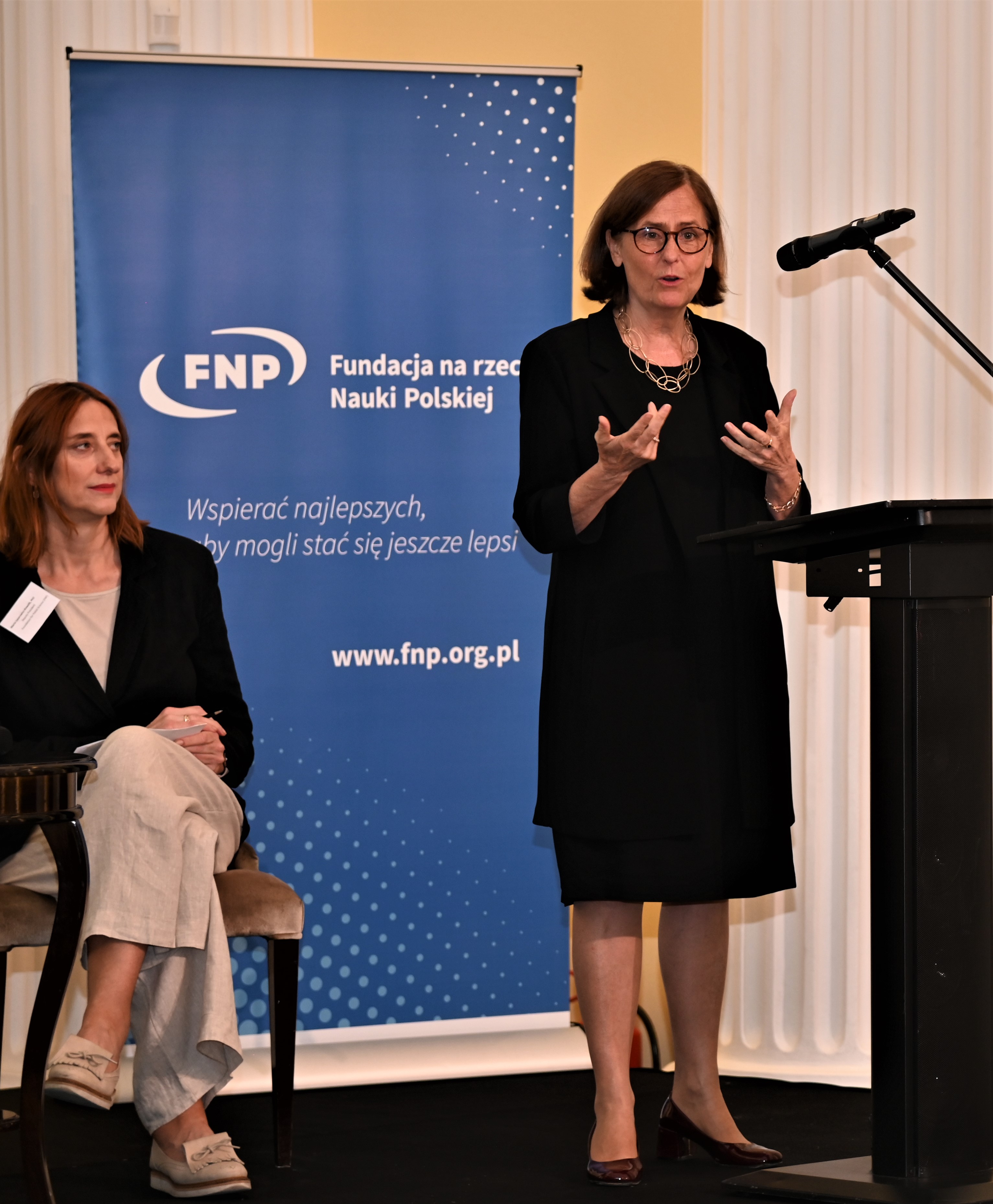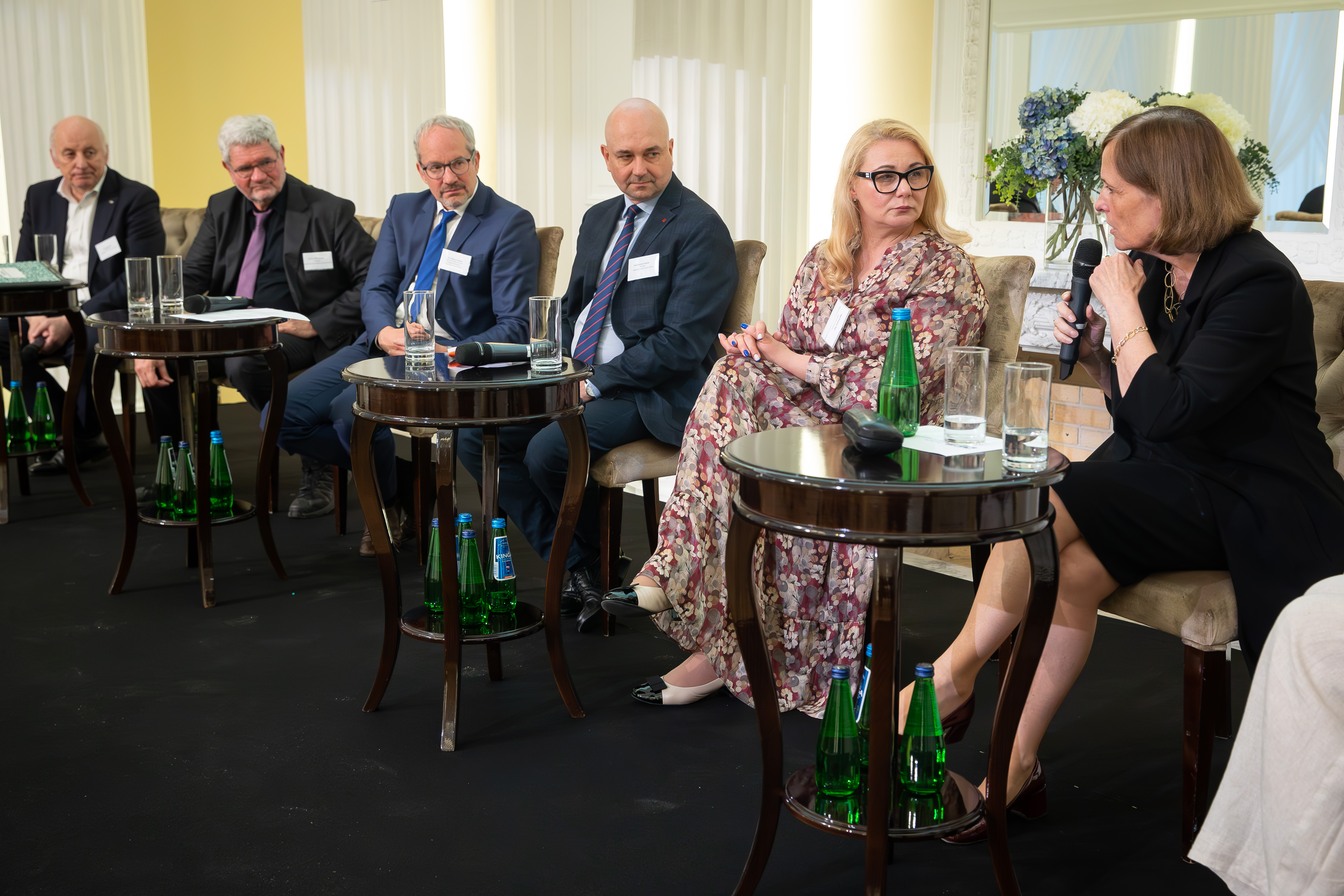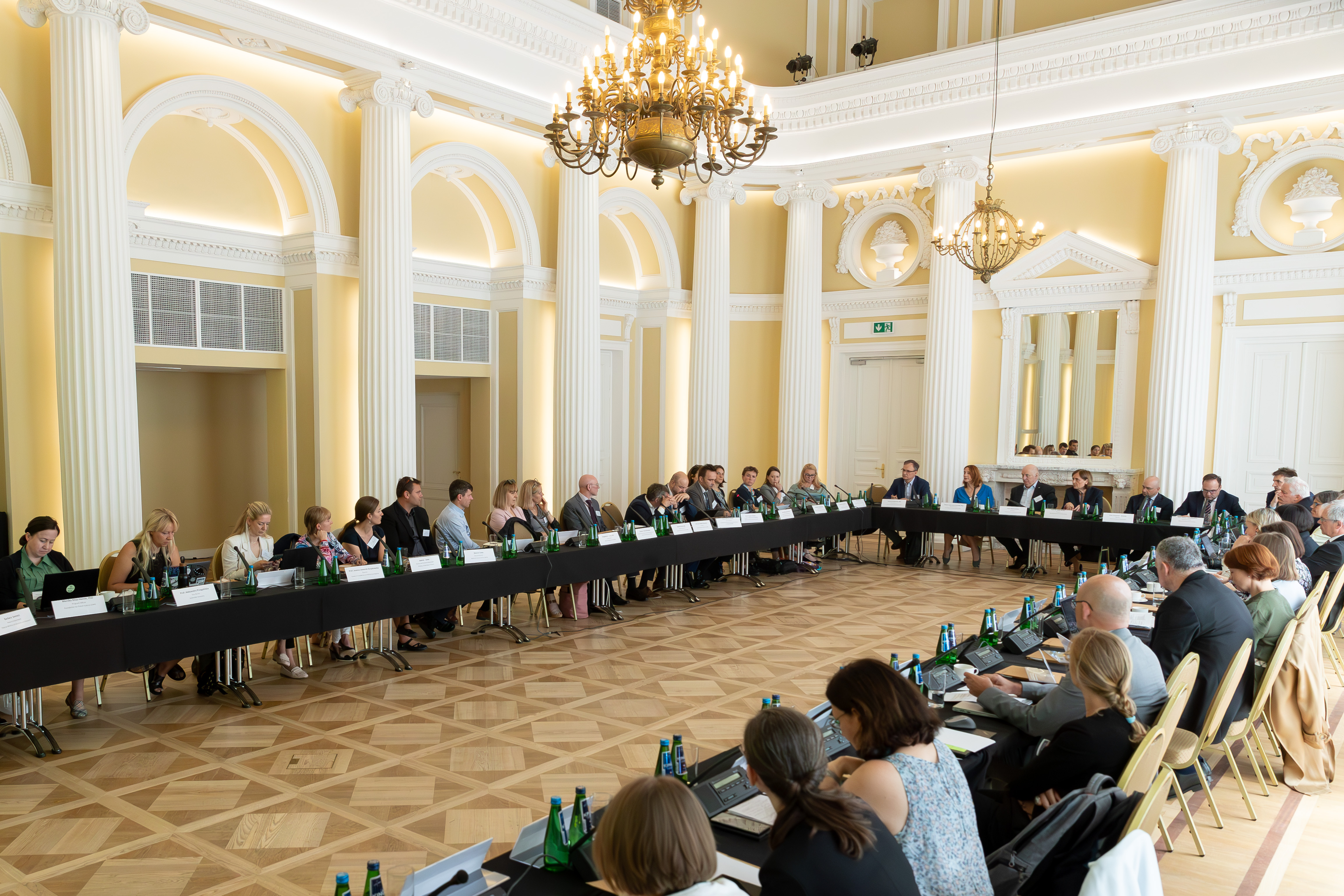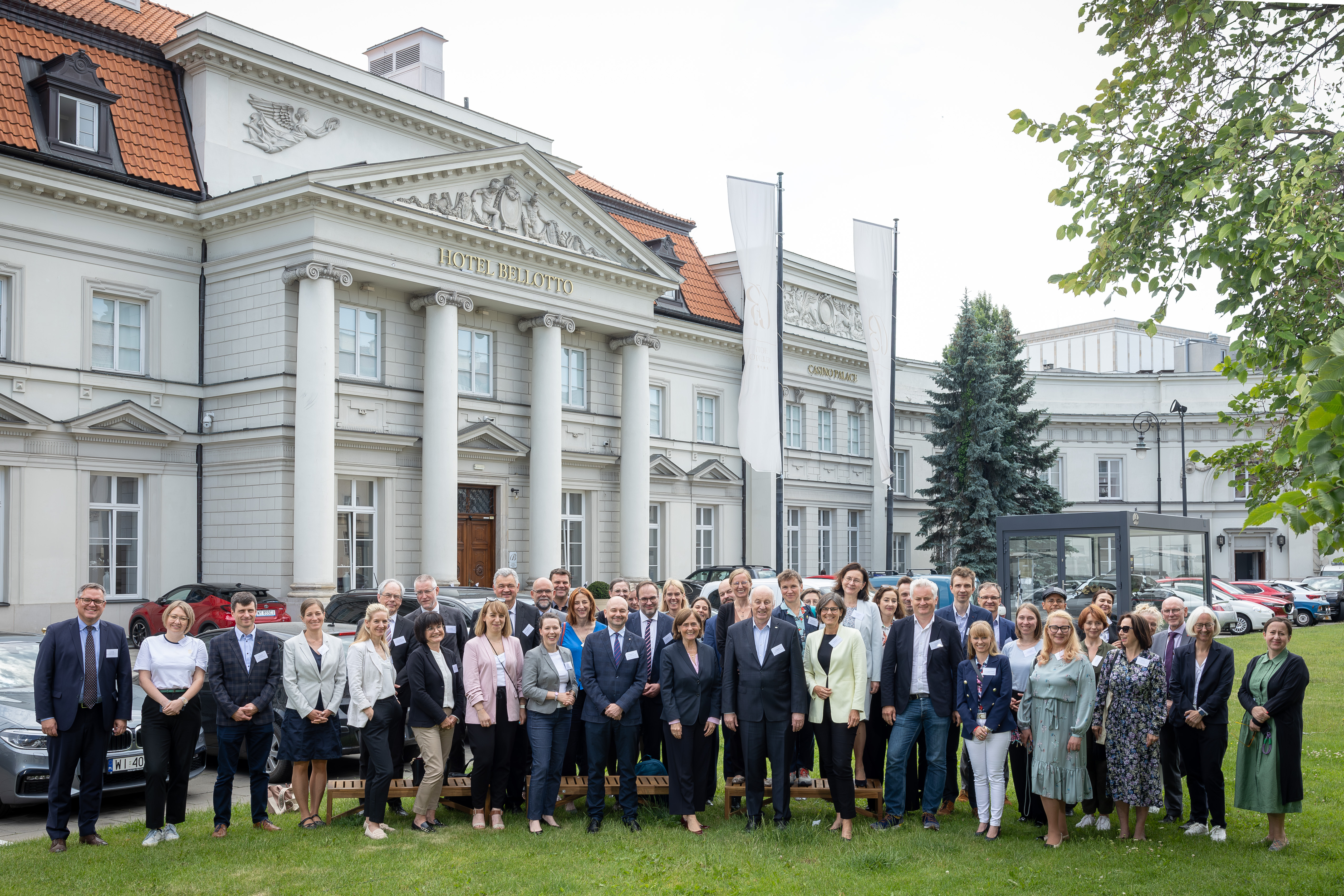Successful Fourth Polish-German Science Meeting with Ukrainian Partner Organisation in Warsaw
10 and 11 June 2024 | Dialogue platform
Words of welcome by the German Ambassador in Warsaw, Viktor Elbling.
© FNP, Paweł Kula
In mid-June, DFG President Katja Becker met with the heads of Polish research organisations, German Alliance of Science Organisations and the National Research Foundation of Ukraine (NRFU) for a high-level meeting in Warsaw. Opened by the German Ambassador to Poland, the event focused on an exchange of views on current bilateral activities, support measures for Ukraine and how to approach the issue of artificial intelligence. This was the fourth time that German and Polish science institutions have come together for a trans-institutional dialogue session. It is a much-appreciated format that is to be continued in Germany in 2026.
Meeting of central research institutions and funding organisations from Poland and Germany
Following previous meetings in Munich (2017), Krakow (2019) and Berlin (2022), the Fourth Polish-German Science Meeting 2024 was jointly organised by the Foundation for Polish Science (FNP), the Polish National Science Centre (NCN) and the DFG in Warsaw. The meeting was held at the historic Hotel Bellotto in the immediate vicinity of Warsaw’s historic old town, giving the high-level event a particularly festive atmosphere. It was attended by representatives of the management and operational level at almost all institutions involved in the science landscape in Poland and Germany. Other participants included representatives of the German Embassy in Warsaw, the Federal Ministry of Education and Research (BMBF) and also the NRFU, thereby enabling continuation of the dialogue with representatives of the Ukrainian research system from the previous Polish-German Science Meeting.
Panel discussion on bilateral activities and support measures for Ukrainian research
The Fourth Polish-German Science Meeting started in the evening of the first day of the event with introductory remarks by the President of the FNP, Professor Maciej Żylicz, and words of welcome from the German Ambassador in Warsaw, Viktor Elbling.
This was followed by a panel discussion moderated by the FNP to exchange views on support measures for Ukrainian research and consider how these can be effectively continued given the ongoing war situation. In addition to the FNP President and the DFG President, panel members included Professor Robert Schlögel, President of the Alexander von Humboldt Foundation (AvH), Professor Anthony Hyman, Director of the Max Planck Institute of Molecular Cell Biology and Genetics in Dresden (MPI-CBG), Professor Krzysztof Jóźwiak, Director of the NCN, and Olga Polotska, Executive Director of the NRFU. The panel discussed short-term German and Polish support programmes for individual Ukrainian researchers (e.g. fellowship opportunities) as well as medium- and long-term support to strengthen the Ukrainian research system as a whole (e.g. further training in science management, opportunities for integration in the European Research Area). The panel discussion provided a structured and comprehensive overview of existing and potential future measures, for which NRFU Executive Director Olga Polotska was especially grateful. In their contributions, German discussion participants also made reference to the international Ukraine Recovery Conference that was due to start the following day in Berlin: here, the Alliance of Science Organisations in Germany was represented for the first time with a panel and also presented an action plan aimed at strengthening and rebuilding research in Ukraine. The subsequent evening reception provided an opportunity to continue conversations started in the panel discussion.
Sharing of experience on how to deal with artificial intelligence in research and research assessment
On the second day of the event, the participating institutions exchanged views on the impact of artificial intelligence on research and research assessment and on how to deal with this phenomenon. Discussions were preceded by an overview talk on how AI works given by Professor Aleksandra Przegalińska of Koźminski University, Warsaw and Harvard, USA. Additional stimuli for discussion were provided by brief keynote speeches given by representatives of Polish and German organisations involved in the areas of both research and research funding. All those present agreed that the use of artificial intelligence in research offered a wide range of opportunities, such as in the analysis of large data sets, and suggested closer networking between research institutions in both countries wherever possible. However, participants also spoke of the risks involved in the use of AI, such as data protection, and advocated responsible use of the technology as well as the possibility of issuing Europe-wide guidelines. The intensity of the debate showed that the topic of artificial intelligence harbours enormous potential for bilateral exchange between institutions.
Continuation of the successful dialogue format
The lively discussions on all topics at the Fourth Polish-German Science Meeting in Warsaw contributed to further mutual networking and confidence-building, thereby helping to boost bilateral relations as well as relations within Europe. In particular, the fact that the discussion of current issues was combined with a continuation of the dialogue with Ukraine promises productive exchange in the future. With this in mind, a continuation of the event series is planned for 2026 in Germany.
A full list of the science institutions that participated in the Fourth Polish-German Science Meeting:
- Alexander von Humboldt Foundation
- Conference of Rectors and Academic Schools in Poland
- German Academic Exchange Service
- Deutsch-Polnische Wissenschaftsstiftung
- DFG
- Foundation for Polish Science
- Helmholtz-Zentrum Dresden-Rossendorf
- Herder Institute for Historical Research on East Central Europe German Rectors’ Conference
- IDEAS National Centre for Research and Development
- Łukasiewicz Research Network
- Max Planck Society
- Medical Research Agency
- National Centre for Research and Development
- National Research Foundation of Ukraine
- National Science Centre Poland
- Polish Academy of Sciences
- Polish National Agency for Academic Exchange
